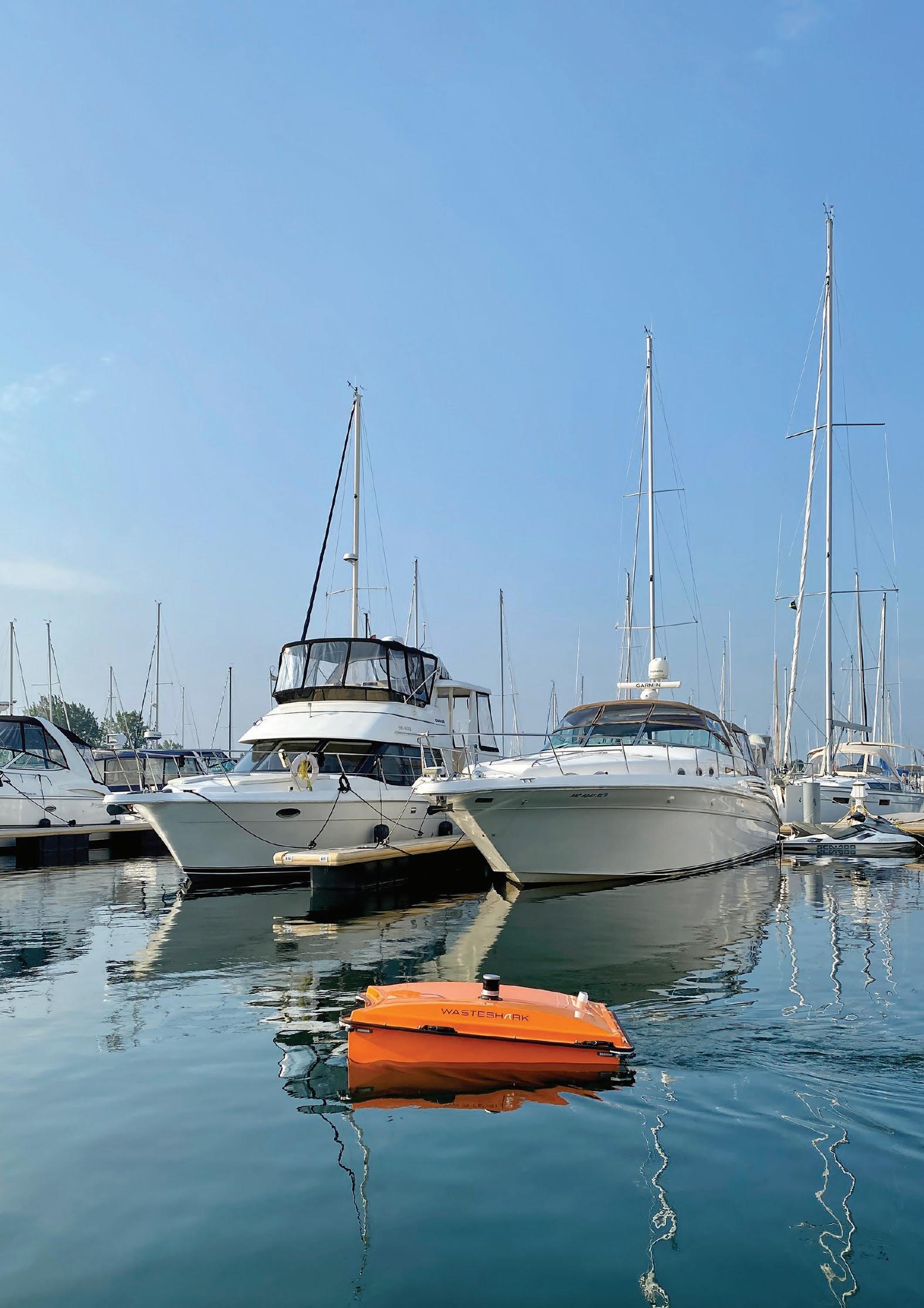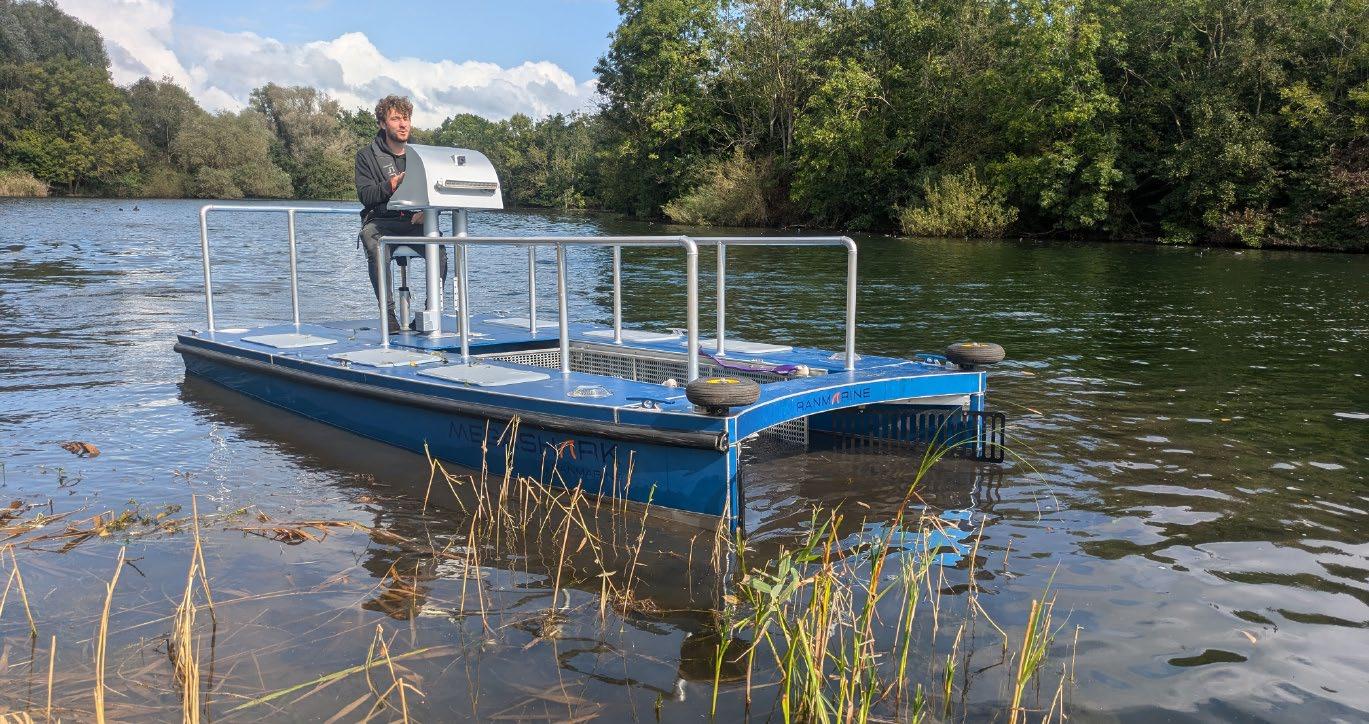






Netherlands-based RanMarine Technology is on a mission to clean up the world’s waters with its innovative autonomous surface vessels (ASVs) and collaborative ventures. Founder and CEO Richard Hardiman shared the company’s progress during an in-depth interview with Inside Marine.
RanMarine’s ASVs are paving the way for a cleaner, more sustainable future for our waterways. “RanMarine was established in 2016 with a clear mission to rid our waters of plastic,” explained Founder and CEO Richard Hardiman. “While we began with a focused goal, our technology has since evolved, allowing us to address broader aquatic environmental challenges.”
basket’s netting is customisable, allowing operators to target specific floating pollutants, from waterlogged debris to smaller items like duckweed algae, ensuring efficient and tailored cleanup.
“By prioritising agility and compactness, we designed the WasteShark to access hard-to-reach areas, while ensuring it could handle moving waters,” noted Mr Hardiman.
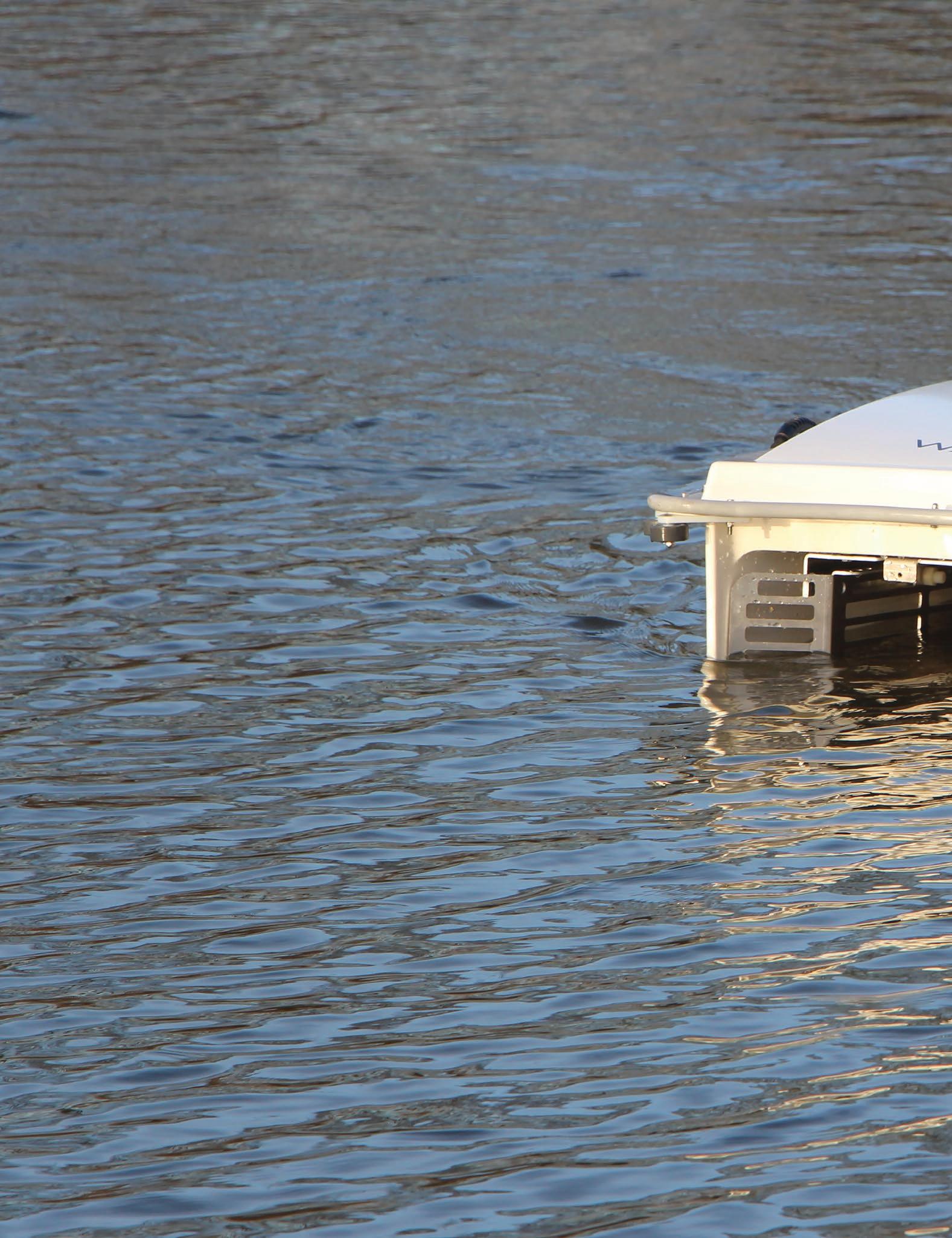
Guided by this broader vision, RanMarine launched its first ASV, the WasteShark. This lightweight, autonomous vessel resembles a small catamaran – roughly the size of a mid-sized dining table – with a basket between its hulls to collect waste. The
The WasteShark can be operated via a handheld remote control or autonomously, utilising advanced GPS, precise positioning through T-Mobile, sensors, cameras and AI. Despite its compact design, the vessel offers impressive storage capacity, enabling it to collect substantial amounts of waste before needing to offload.

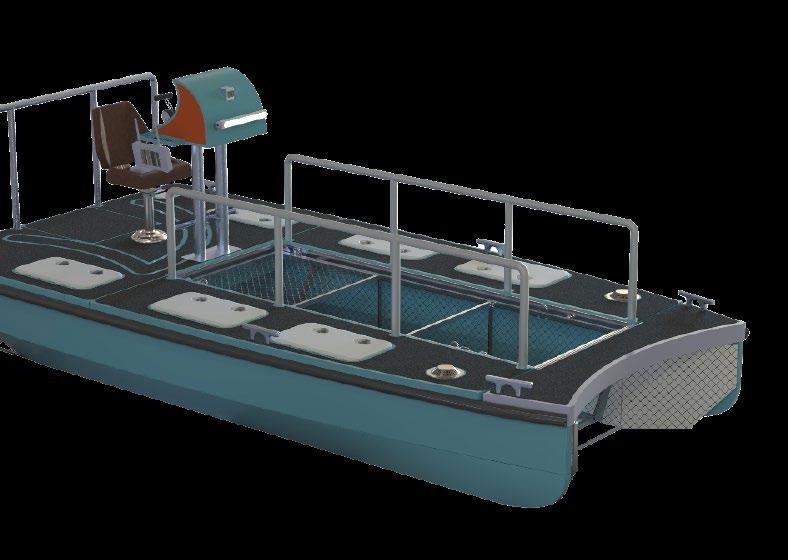

RanMarine’s partnerships have been instrumental to its success. Collaborators include Aquavision for its high-precision Eureka sensors and RimDrive, which enhanced the vessel’s thrusters to reduce blockages. Unlike traditional propeller systems, RimDrive’s design eliminates shafts, ensuring smoother operation even in debris-laden waters.
While the WasteShark is easy to deploy and highly agile, RanMarine recognised the need for a larger solution to tackle bigger challenges. This led to the development of the MegaShark, a high-capacity ASV launched in August last year.
“We always envisioned a larger vessel to complement the WasteShark,” shared Mr Hardiman. “The WasteShark




excels in efficiency, but the MegaShark delivers the scale and capacity needed for tougher tasks.” With proper maintenance, RanMarine’s ASVs operate reliably for 12-15 years, ensuring sustainable, long-term water management solutions.
Designed to resemble a conventional catamaran-workboat, the MegaShark offers familiar functionality. Operators can helm it on board or remotely, making it highly versatile. Fully electrified, it operates emission-free with Cleantron batteries powering eight or more hours of continuous use.
The MegaShark’s enhanced capacity and robust aluminium design enable it to tackle rougher waters whilst efficiently cleaning large waterways, ports, and harbours – all while staying true to RanMarine’s sustainability principles.
Both the WasteShark and MegaShark utilise RanMarine’s proprietary software to enable full autonomy. Designed to target floating waste, algae and biomass on the water’s surface, the ASVs capture debris efficiently while also mapping water quality metrics. The integrated data portal aggregates and geo-codes this information, providing operators with actionable insights to better understand and manage their environments.
“Today, we remove waste, clear algae and map water quality with precision,” said Mr Hardiman. “Our technology is capable of transforming water systems in ways we never initially imagined, which is hugely exciting.”
RanMarine’s software development has expanded the company’s mission far beyond clearing plastic and simple algae from the world’s waters.
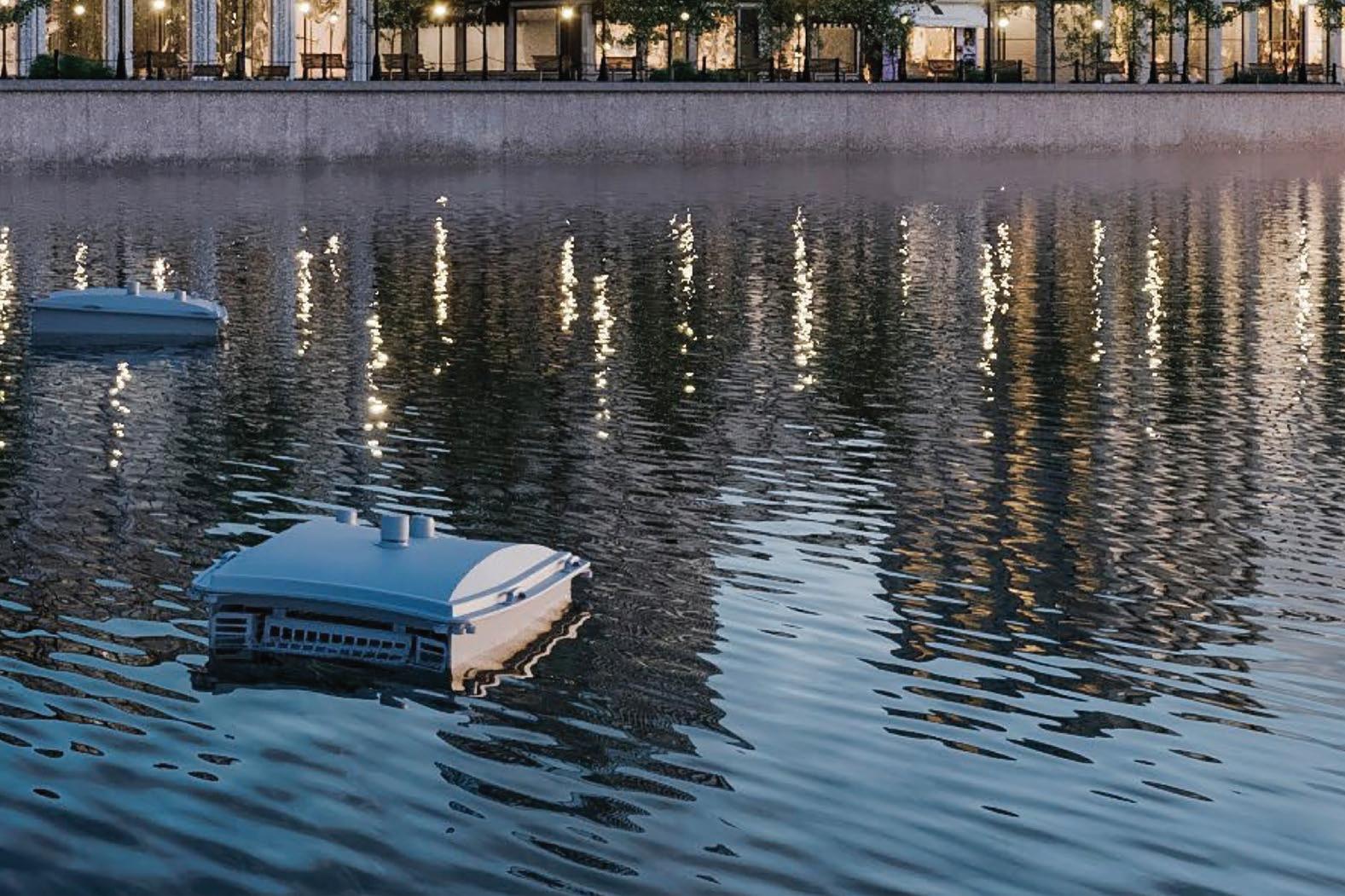
“Every year since our founding, we’ve been asked about tackling Blue-Green algae,” said Mr Hardiman. “Removing it from the surface can be done, but the real challenge lies in handling it post-removal and preventing future blooms. To achieve these goals, we needed a partner with a chemical-free solution.”
Cyanobacteria, also known as Blue-Green algae, can pose severe hazards to aquatic ecosystems, humans and animals. These algae release toxins that contaminate water supplies, harm wildlife and create dead zones by depleting oxygen levels. Addressing this issue requires both innovative removal and sustainable treatment methods.
Enter Eget Liber, a specialist in chemicalfree water solutions. While the company had developed a system to neutralise Blue-Green algae by breaking it down and restoring oxygen to the water, Eget Liber needed an autonomous platform to deploy it effectively.

“Eget Liber approached us two years ago with its solution, which involves driving over algae and killing off the live bacteria, and at the same time mitigating further potential blooms,” explained Mr Hardiman. “We helped automate the process to enhance data collection and system control. This collaboration has been highly rewarding.”
The partnership has now expanded to include Clear Water Systems, a biotechnology leader, for a pilot project in Lough Neagh, Northern Ireland. Backed by a portion of a shared £450,000 grant, the initiative aims to test an integrated system that combines RanMarine’s ASV technology
with Eget Liber’s algae treatment and Clear Water Systems’ expertise in biotechnology.
“We’ll know more after testing, but I’m confident this could revolutionise the industry,” said Mr Hardiman. “Toxic algae blooms are a recurring problem in many European lakes. If we can address this effectively, then it would be transformative. Long-term, we hope to see this technology used proactively to prevent blooms before they occur.”
With its sights set on the future, RanMarine is pushing the boundaries of ocean cleanup with several new developments, including the highly anticipated OilShark.
After maritime logistics provider HEBO Maritiemservice sought a quick solution for minor oil spills, RanMarine began designing the OilShark.
“The goal was to create a first-response ASV for minor fuel leaks and oil spills in ports,” explained Mr Hardiman. “Initially, we developed a small oil collection unit for the WasteShark, but it quickly became clear that it wasn’t suited for larger commercial jobs. As we were preparing to launch the MegaShark, adapting it for this purpose made sense.”
This collaboration has been a gamechanger for RanMarine, enabling it to enter the hydrocarbon cleanup market while leveraging HEBO’s expertise as an oil spill response company. The partnership also freed resources for reconsidering other innovations, such as the SharkPod.
Set for completion this year, SharkPods are docking stations for RanMarine’s ASVs,
RanMarine also produces an innovative ASV called TenderShark, which stemmed from a Mediterranean moment of insight – when a friend’s yacht ran short of basic supplies, requiring a costly and environmentally insensitive shore-to-ship delivery. This inspired Mr Hardiman to adapt WasteShark’s proven technology into an emission-free autonomous vessel for waterbody deliveries, streamlining harbour logistics.
designed to charge batteries, discard collected waste and enable continuous 24/7 operations. Available in multiple sizes to meet varying customer needs, the SharkPods will further streamline ASV deployment.
“The SharkPods are a perfect addition to our roadmap because they offer universal benefits to our customers,” said Mr Hardiman. “This has been a long-standing project, and I’m excited to see it implemented.”
RanMarine’s dedication to research and development remains a cornerstone of its success, but the company is now shifting focus towards global commercial operations.
“R&D will always be critical to what we do, but we’re also focusing on scaling commercially to ensure long-term success for our clients and the business,” added Mr Hardiman. “This includes enhancing our production capacity to meet growing demand, ensuring we can deliver solutions at scale and with consistent quality.”
In addition to expanding production, RanMarine is strengthening its customer support and training programmes, which have become key pillars of the business. n
